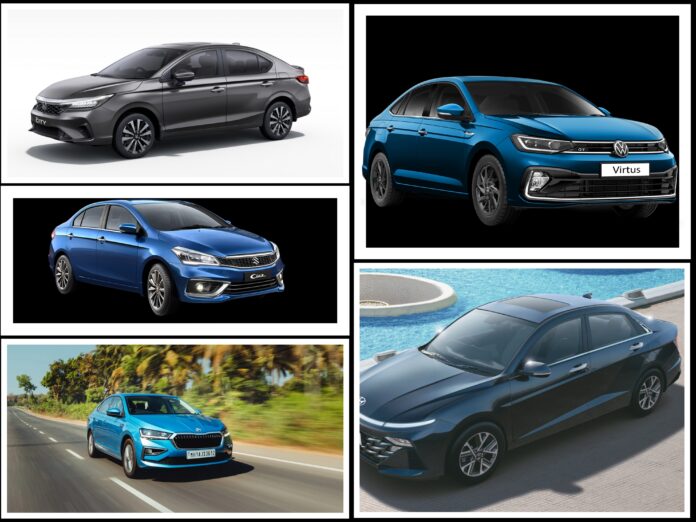Pitted against the likes of the Maruti Ciaz, Honda City, Skoda Slavia, and Volkswagen Virtus, the all-new Hyundai Verna has recently been launched in India in the price range between Rs 10.90 lakh and Rs 17.38 lakh (ex-showroom). The mid-size sedan comes with a revolutionary design, hi-tech interiors, and 1.5-litre turbo petrol engine delivering the most powerful performance in its class. In this specification comparison review, we weigh up the new Verna against its rivals to find out whether the new Hyundai deserves your hard-earned money:
1) Dimensions and Space:
Compared to its predecessor, the new generation of Hyundai Verna has grown in all aspects except height. It is lengthier and wider than before and crucially adds 70mm between the centers of the front and rear wheels. However, Verna is still not the most spacious car as Slavia, City, and Virtus take the lead in the length department. Verna is the shortest in height although it also has an advantage in terms of having the longest wheelbase. Further, the widest 1765mm of the frame and largest 528-litre boot equips the Verna with solid space credentials. One similarity among all the sedans in this comparison is their 16-inch size wheels which are standard across the top trims of these cars.
Hyundai has made the new Verna available in both naturally aspirated (NA) and turbo-charged versions of a 1.5-litre petrol engine. The NA engine is paired with a 6-speed manual and CVT options while the turbo variant can be had with a 6-speed manual or 7-speed DCT. Maruti Ciaz is the only car in this comparison which gets a single 1.5-litre petrol engine options while all others have two engine options.
In NA avatars, Honda City is the most powerful sedan in terms of power output; however, VW Virtus and Skoda Slavia deliver the highest 175Nm of torque. Hyundai Verna has the advantage when it comes to the output from the turbo variant as it offers the highest 160bhp of max power while delivering 253 Nm of torque – identical to what City offers to buyers in its hybrid avatar. Hyundai and Skoda are the only one which offers the convenience of both manual gearbox and automatic transmission with their higher-spec engine while both Volkswagen and Honda come only with automatic convenience with their high-end engine models.
3. Prices:
The prices for the new Hyundai Verna equipped with NA engine range between Rs 10.90 lakh – Rs16.20 lakh while for higher-end turbo variants, the prices stretch from Rs 14.84 lakh to Rs 17.38 lakh. Hyundai has done a fabulous job by undercutting the starting price of all other models except the Maruti Ciaz which has an entry-level price of Rs 9.20 lakh. Even when it comes to high-end engine variants, the new Hyundai Verna has a huge cost advantage over its rivals.
Compared to the Rs 14.84 lakh asking price of Verna, the range of Slavia and City for higher-spec engines starts at Rs 17 lakh and Rs 18.89 lakh. VW, on the other hand, offers high-spec Virtus in a single version priced at Rs 18.42 lakh. All of this is about to change as VW and Skoda variants prices are set to go higher. Hyundai could raise the price of its introductory range in the months to come. The VW twins will be preferred by enthusiasts. Meanwhile, the Verna will appeal to someone who is looking for some unique and loves ADAS as well. The city will remain a choice for those who don’t like to risks and Ciaz remains the budget option which desperately needs an update and could come as an all-new model late next year with a possible Toyota twin of it as well.




